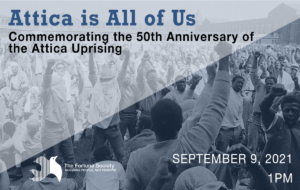
- This event has passed.

On September 10th, 1971, I came to Attica as one of thirty observers summoned by the leaders of the uprising to witness their negotiations with the state. Though The Fortune Society was in its infancy, founded only four years prior, the organization had become popular among incarcerated individuals at Attica for our monthly newsletter. The men of the Attica prison weren’t revolting against a set of policies — they were revolting against a culture. Attica was characterized by anti-black violence and an aggressively enforced system of segregation. The racism of the prison guards was overt. The violence they inflicted was fomented by the power of their position and their impunity from consequence.
The brutality experienced by the men of Attica had been the subject of numerous grievances. When those were ignored, they wrote to The Fortune Society.
I was in correspondence with two of the men who emerged as leaders: Rodger Chapman and Herbert X. Blighten. They were asking for more humane treatment while incarcerated, and for the tools to function when they came out.
After the massacre, many of the bodies of the 43 lost were left unclaimed. The Fortune Society identified these men, contacted their families and held a memorial to commemorate their lives. After leaving the Attica facility, those like Joe Little became active members of the Fortune community and helped connect many men at Attica to Fortune’s services for years after.
Our Policy Center Collective will host Attica is All of Us, commemorating the 50th anniversary of the Attica Prison uprising. Join us via Zoom next Thursday at 1 PM as Fortune staff and participants discuss the importance of the Attica uprising.
With gratitude,
David Rothenberg
Founder
The Fortune Society

